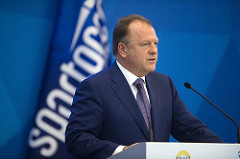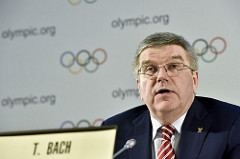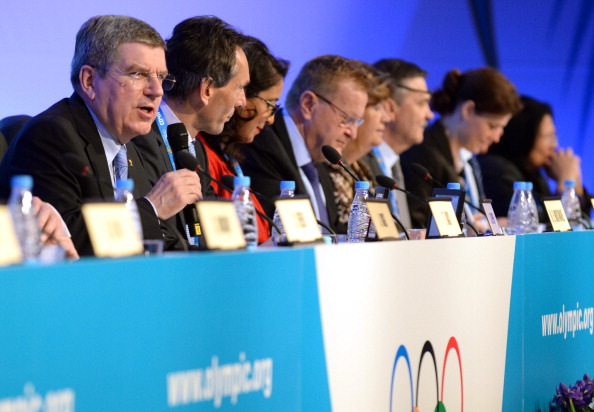If English is not your first language, or you have forgotten or never learned about the dangers inherent in mining, or you have (inexplicably) little to no regard for “Zenyatta Mondatta,” the classic 1980 album from The Police, herewith an appreciation of the phrase “canary in a coal mine.”
And why, like the canary, the Olympic movement is an eerily prescient predictor of change buffeting our uncertain, if not broken, world — the kind of change that produced Brexit, the vote Thursday that will now lead to the United Kingdom’s self-inflicted divorce from the European Union.
Brexit makes for nothing less than a seismic event in the history of all of our lives.
At the same time, the very same forces that came together to usher Britain out of the EU have been vividly on display for the past several years in any reasonable assessment of international sport, and particularly in reference to the International Olympic Committee: disdain if not outright rejection of political elites, bureaucracies and institutions, most if not all of it animated by grievance along with its historically volatile corollary, fear of the “other.”
Indeed, the evidence makes a strong case that the Olympic scene is arguably nothing less than a — if not the — leading indicator of big-picture trends in an increasingly globalized world.
That is, a canary in a coal mine.
The first coal mines did not feature ventilation systems. The legend goes that miners would bring a caged canary down with them. Why? Canaries are sensitive to methane and carbon monoxide. As long as the bird sang, the miners knew their air was safe. A silenced canary meant it was time to move, and fast.
Consider any number of recent IOC host city elections in the early years of the 21st century — indicators, all, of intensifying interconnected-ness:
— The tacks to China (2001 in 2008), Russia (2007 for 2014) and Brazil (2009 for 2016).
— The Olympic telegraph of the rise of Asia, both acknowledging and accelerating its economic and political might, with the awarding, after 2008, of three Games in a row there -- 2018 Winter (South Korea), 2020 Summer (Tokyo), 2022 Winter (Beijing).
Beijing will be the first city in Olympic history to stage both Summer and Winter Games, and China re-emerged on the Olympic stage only in the 1980s.
Beijing won for 2022 in an election last summer, defeating Almaty, Kazakhstan. Here was the flip side.
Six cities in Europe dropped out, five put off to varying degrees by the $51 billion figure associated with those 2014 Sochi Olympics: Oslo, Munich, Stockholm, Davos/St. Moritz and Krakow, Poland. A sixth, Lviv, Ukraine, fell out because of war.
Just two candidates for the Winter Olympics?
And maybe now just three for the ongoing campaign for Summer 2024?
The original 2024 list of five — Hamburg, Los Angeles, Paris, Rome and Budapest — is already down to four, German voters having rejected Hamburg. Four very well may soon shrink to three amid this week’s election of a new mayor in Rome, Virginia Raggi, for whom the Olympics is not a priority: "Already with 13 billion euros ($15 billion) in debt, Rome can't permit taking on more debt to make cathedrals in the desert."
Déjà vu all over again, maybe: in 2012, the then-prime minister of Italy called off Rome’s 2020 bid, citing uncertain [read: too high] costs.
And Los Angeles, of course, took over for Boston when locals objected vehemently to the notion of an Olympic invasion.
As telling as the Olympic indicators have been for the wider world, those same markers are equally if not more on-point for the Olympic movement itself and, especially, the IOC.
The collision of interests that gave rise to Brexit leads now suddenly if inevitably to the logical and legitimate Olympic question:
Can the structure of a club born in the 1890s and driven for most of these past 130 years by Europe find, by itself, a way to engineer an appropriate 21st-century governance that will help sustain its position in the world?
Or will change — in a form the IOC might or might not like — be imposed upon it?
In the way that it has been imposed, thanks to the FBI and Swiss authorities, on scandal-plagued FIFA?
In December, 2014, the IOC membership unanimously voted for a 40-point reform plan, dubbed “Agenda 2020.” Within the Olympic bubble, Agenda 2020 has become a ready point of reference — a talking point but, let's face it, lip service, really.
In the real world, Agenda 2020 has offered little if anything in response to the onslaught of challenges playing out in real time.
Any Games is supposed to be a celebration of possibility. With roughly six weeks to go, and keeping in mind that perhaps all will be steady once the Olympic cauldron is lit in Rio, those Games are on course to possibly be the biggest cluster of all time:
Where to begin? There's Zika and the withdrawal from the Games of golf and basketball stars, bad water, the collapse of political and economic institutions as well as even a showpiece beachfront sidewalk, allegations of major governmental corruption, street crime, uncertainty among the locals and, the latest, the shut-down of the Rio anti-doping lab.
And, of course, accusations of state-sponsored doping in Russia.
And more. Like, maybe the subway to Olympic Park gets finished. Or maybe not.
As it was winding around Brazil, the Olympic flame relay seemed to be the sole beacon of sanity — until someone had the dumb idea of using a chained jaguar, an endangered Amazonian jungle cat, as a relay prop. It somehow escaped its army handlers. An army officer thereupon shot and killed it.
For those looking deeper into the symbolism: the jaguar is the official mascot of Brazil’s Olympic team.
So, as NPR pointed out, they sort of went and killed their own mascot in Brazil.
This can lead to all manner of deep thoughts about existentialism. Such thoughts are perhaps better reserved for philosophy, and what-if’s.
What's real is relevance.
And the IOC’s No. 1 challenge, always, is to remain relevant in a changing world — to reach out to young people in hopes of serving as a bridge to connection and inspiration. To celebrate humanity, as one of its better marketing campaigns years ago put it.
Swinging away from the jaguar and back to the canary: if it were singing an Olympic song, it would ring out all about the three core Olympic values -- friendship, excellence and respect.
Where is that song?
Is it even being hummed amid the cha-ching that is Olympic cash flow?
Make no mistake: 21st-century sport is not just dreams and inspirations. It is also big business.
It is, at a very real level, institutional.
Perhaps at no time in its history has the acronym “IOC” served as an illustration of the contrast between what those inside the Olympic bubble believe it to be and, more important, those without.
There are, indeed, fascinating comparisons to be drawn between the IOC on the one hand and, on the other, Brexit and the EU.
Some observations from Friday’s reporting, and just substitute in “IOC” where appropriate:
Financial Times -- "Political elites are under pressure everywhere in the west. Donald Trump is a candidate for US president. Marine Le Pen is bidding for France’s Élysée Palace. But who would have thought pragmatic, moderate, incrementalist Britain would tear down the political temple? This week’s referendum result was a revolt against the status quo with consequences, national and international, as profound as anything seen in postwar Europe."
Washington Post -- “We are in the midst of a worldwide sea change regarding how people view themselves, their government and their countries. The Brexit vote and the rise of Trump — while separated by thousands of miles and an ocean — are both manifestations of that change. There will be more."
Another from the Post, and the strikethroughs are in the original -- “As Trump himself notes, the issues that dominated the Brexit campaign and his own campaign are similar: hostility to immigration, resentment at cosmopolitan elites, frustration with unelected officials telling ordinary citizens how to live, and a persistent perception that the status quo favors minorities layabouts over white ordinary, Anglo-Saxon decent, Christian hard-working citizens.”
New York Times: “The European Union hasn’t done a good job of explaining its purpose — it’s too opaque, too bureaucratic, too confusing — and its slow handling of the debt crisis, especially in Greece, where it acted fast so French and German banks could cut their losses, but left Greece asphyxiated, had devastating consequences for all. Decisions made for short-term financial stability have led to long-term political instability.”
It’s all reminiscent of what the former IOC Games director Gilbert Felli said amid the 2022 drop-outs: “We lost good cities because of the bad perception of the IOC, the bad perception of how the concept could be done.”
At one point before Oslo formally pulled the plug, a poll suggested that 60 percent of the Norwegian public was against a 2022 bid, with only 35 percent in favor. Oslo! The very soul of winter sports, where Norwegian news outlets ran gleefully with reports about perceptions of the special privileges that would be afforded IOC members at a Games — including cocktail protocols, stocked hotel bars, even hotel room temperatures.
The IOC’s response when Oslo pulled out? It lashed out, saying politicians were misinformed, “left to take their decisions on the basis of half-truths and factual inaccuracies.”
Last November, voters in Hamburg became just the most recent in a succession of ballot initiatives to shoot down the IOC.
Why? A few weeks later, a local dentist told the Guardian, the British newspaper, “I think the people of Hamburg are fed up [at] being short-changed by private companies when it comes to major public projects.”
When voters in Bavaria said no the year before to Munich 2022, here was the key take-away, from Ludwig Hartmann, a Greens Party lawmaker and leader of the movement, called “NOlympia,” that led to the opposition to the project: “The vote is not a signal against the sport but against the non-transparency and the greed for profit of the IOC.”
The IOC, to be clear, is not a for-profit institution.
In other respects, it has real work to do.
It’s not that this is a secret in the Olympic world, either. At the SportAccord conference in Sochi in 2015, Marius Vizer, the-then SportAccord president who is also head of the International Judo Federation, called out the IOC in his usually direct way, accusing it of running a system that had become sclerotic.
In his words: “History demonstrated that all the empires who reached the highest peaks of development never reformed on time and they are all headed for destruction. The IOC system today is expired, outdated, wrong, unfair and not at all transparent.”
In effect, Vizer was the Olympic canary in the coal mine.
The IOC response: kill the canary -- er, the messenger.
Lamine Diack, the-then president of the IAAF, the track and field federation, served as the primary IOC proxy, taking the IAAF out of SportAccord and calling Vizer a “chief coming from nowhere.”
To make a long story short, Diack is now under criminal inquiry in France, suspected of accepting more than $1 million in bribes to help Russian athletes evade sanctions for tests.
Moreover, Tokyo’s winning 2020 bid is now under suspicion. In the months immediately before and after the 2013 vote for 2020, $2 million is thought to have been transferred from Japan to an account in Singapore controlled by a close friend of one of Diack’s sons, Papa Massata Diack, long an IAAF “marketing consultant.”
Vizer, in Sochi in 2015: “I dedicate and I sacrifice my family for sport. I mean sacrifice in the way of dedication. And in my eyes,” now referring to Diack, he is “a person who sacrifices sport for his family.”
Friday’s New York Times also included a column in which a reporter recalls being on assignment in Russia and, while there, hears a film producer make this sardonic observation: in Russia, “the future has become unpredictable — and so has the past.”
Substitute “IOC,” again.
And here, too, from the final paragraph of that same column — once more, plug in “IOC” or “Olympic movement” in place of the proper nouns: “Who inherits England? It’s a question that has obsessed British novelists for decades. And who inherits Europe? Today in Europe the past is equally unpredictable, and the path ahead looks very uncertain.”




